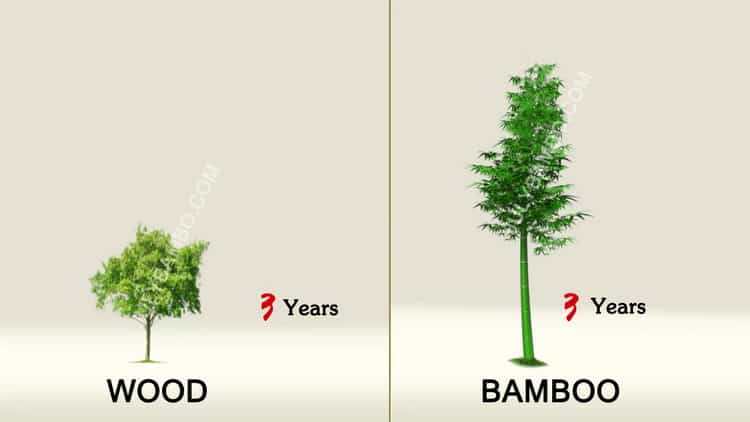Bamboo has been a buzzword for a long time. The hype isn’t only due to the material’s eco-friendliness or anti-microbial properties. But, wait. There’s more to the subject.
The Bamboo plant matures in 5 to 7 years. It also grows faster than other flooring alternatives like Oak. Oak takes around 30 to 40 years to experience full growth. This makes Bamboo a viable option to use in our homes as countertops.

Let’s find out.
Using Bamboo Flooring as a Countertop
Using Bamboo flooring in your kitchen as a countertop is a new trend in modern households. The measurements must align, but if not, you can carve the wood pieces as they best fit.
The normal measurements for kitchen bamboo countertops in America are 30 square feet. Knee clearance should be at least 27 inches, and the countertop should be between 28 and 34 inches in height. These dimensions are great for making the area accessible to those in wheelchairs. A kitchen consists of many devices and accessories.


Start by taking measurements of the kitchen countertops. Go to the floating shelves next, and the island to determine the size of your countertops. Also, include the backsplash in inches as well. Now, take the width of the kitchen countertop. Increase it by the total length of the countertops in inches.
Make observations of all existing countertops along the wall. Measure the length of the current island countertop from end to end. To calculate breadth, you measure across the island. If the countertop butts into a wall, test the exposed end of the tape against the wall.
Is Bamboo Flooring Good For Kitchens?
Yes. Bamboo flooring is good for the kitchen, and there are a dozen reasons why. You can use stranded, engineered, or solid bamboo flooring for your kitchen. These types withstand the temperature.
Bamboo has properties that other kitchen countertops don’t. It’s anti-microbial, making it an ideal raw material for kitchen countertops. It also absorbs moisture better than other woods. But, these countertops have a higher chance of getting stained.
But, you can clean it with soap and a sponge. So, it’s easier to maintain and clean. You can clean the bamboo countertop with vinegar and water. Scraping it off with a spatula will work if there is sticky debris.
Bamboo doesn’t foster bacteria growth as a material. But, regular cleaning will cut even the slightest chance of germs. You can try vinegar for daily disinfection. It will add an extra layer of protection to your kitchen’s bamboo countertop.
Which Types Of Bamboo Flooring Is Good For Kitchens?
Bamboo flooring comes in three varieties: vertical, horizontal, and strand-woven. Solid planks are 12 to 5/8 inches thick, whereas engineered planks are 3/8 to 12 inches thick.
Engineered planks are suitable for floating flooring in damp or very dry areas. They are made with a bamboo veneer on top of a plywood or bamboo base for extra stability. Consider 34-inch-thick raw planks. You can use solid, engineered, or strand-woven bamboo carpeting in your kitchen.
Bamboo is a natural floor surface that can stand minor humidity and pressure changes. You’d expect to find three kinds of conditions in a kitchen. Because Bamboo is robust and adaptable. It will adjust to these alterations while remaining unharmed.
Where Else Can I Use Bamboo Flooring?
Bamboo is a versatile raw material, and you can use it as a flooring option throughout your house. It’s also considered durable and sustainable. Plus, you can install it on any subfloor if you plant the foundation in a perfect way.
Bamboo flooring material gives you a list of options to choose from. But, before you buy those, you must look for a legitimate manufacturer.
You Can Use Bamboo Flooring On:
●Kitchen
●Living room
●Laundry room
●Bedroom
●Dining rooms
●hallways
●Offices
●Nurseries
Bamboo flooring is suitable for any place except for the bathrooms. You may wonder why? Well, Bamboo swells up like other woods when it’s exposed to water and moisture.
Bamboo Countertop Maintenance & Aftercare
Bamboo is prone to stains, but it can be a long-lasting material with proper care and maintenance. Cleaning and disinfecting the countertop from time to time helps big time. The right sealing and refinishing can renew your bamboo countertops.
The Aftercare of bamboo countertops includes sanding and oiling the countertop. They need sanding. But, you can skip this maintenance step if you recently bought the countertop. The manufacturers have already oiled it.
The sanding and proper care will get rid of the blemishes, stains, and other flaws. Any built-up on the countertop through a stretch of time and restore the surface to a smooth, clean state.
Conclusion
Bamboo flooring wood is suitable for bamboo countertops in all possibilities. You will only have to measure the wood in a correct manner. Care for the countertop on a day-to-day basis to keep it looking new and afresh.


